Myanmar junta releases jailed Australian Sean Turnell
Myanmar’s junta has said it will release 700 prisoners, including a former British ambassador, a Japanese journalist and an Australian adviser to Aung San Suu Kyi’s ousted government.
Former British envoy Vicky Bowman, Australian economics adviser Sean Turnell and Japanese journalist Toru Kubota “will be released to mark National Day”, a senior officer told the AFP newswire.
Bowman, who served as ambassador from 2002 to 2006, was detained with her husband in August for failing to declare she was living at an address different from the one listed on her foreigner’s registration certificate.
They were later jailed for one year. Her husband, prominent artist Htein Lin, will also be released, the official said.
Sean Turnell was working as an adviser to Myanmar’s civilian leader Suu Kyi when he was detained shortly after the coup in February last year.
In September, he and Suu Kyi were convicted by a closed junta court of breaching the official secrets act and jailed for three years each.
Kubota, 26, was detained in July near an anti-government rally in Yangon along with two Myanmar citizens and jailed for 10 years.
Families gathered outside Insein prison in Yangon ahead of the expected announcement, an AFP reporter said.
– from AFP
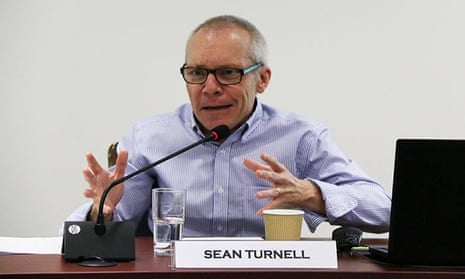
Key events
Filters BETA
Third person missing in Eugowra
Police are appealing for public assistance as they search for a third person feared swept away in floodwaters at Eugowra.
NSW Police say:
A police officer was assisting an elderly woman trapped in floodwaters at the intersection of Loftus and Parkes Streets about 9.40am Monday when she saw the body of a man in floodwaters.
The officer was unable to leave the trapped woman and she lost sight of the body in floodwaters.
As there have been no further reports of people missing from the area, police are now making a public appeal to identify the person, while they continue to search the surrounding area.
The man sighted was described as being aged in his 20s, of Caucasian appearance, with a slim build and fair hair.
After extensive inquiries with the community and despite a wide-ranging search of the surrounding area there have been no further sightings of the man, and no one matching that description has been reported missing.
The body of a 60-year-old woman was recovered yesterday, while the search continues for Ljubisa ‘Les’ Vugec, aged 85, who was last seen at a home in Evelyn Street, Eugowra, about 9am Monday.
Police fear a third person may have been swept away in floodwaters at Eugowra. A man aged in his 20s, Caucasian appearance, slim build & fair hair, was seen in floodwaters Monday 14/11. If you can help, Crime Stoppers 1800 333 000
➡️ More details: https://t.co/vFXxMmIhVx— NSW Police Force (@nswpolice) November 17, 2022
Extreme weather fuels government oppression in island nations, study finds
Guardian Australia’s Pacific Project, headed by Kate Lyons, was recognised for its important work at last night’s Walkley Awards.
Lyon’s latest article today is another example of just how crucial it is to report on the challenges for the region is facing. She writes:
Island countries are more vulnerable to government oppression after natural disasters – according to new research – and there are concerns that the increased frequency of weather-related events due to the climate crisis, could see the further rise of autocracies around the world.
The research, published this month in the Journal of Development Economics, examined data from 47 small island countries, including in the Pacific, south-east Asia and the Caribbean, from 1950-2020 to estimate the relationship between extreme weather events, such as cyclones and severe storms, and the level of democracy in a country.
Read the full story here:
Flooding in Forbes – in pictures

Mike Bowers
Guardian Australia’s photographer at large, Mike Bowers, is in Forbes as the community sees major flooding for a third time this month. Here are just a few of his pictures taken today.
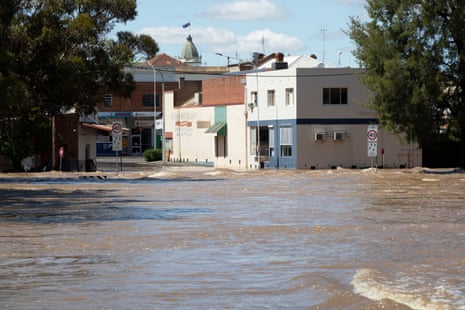
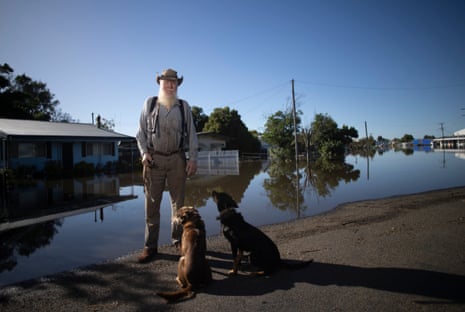


Council in Victoria’s north delays flood report to ensure it is comprehensive
A council in northern Victoria will send a flood report back for further drafting as historic floods continue to batter the state.
Campaspe shire council, which serves areas including Echuca and Rochester, moved to return the Echuca-Moama flood study for further drafting to ensure its accuracy.
Councillor Adrian Weston told the meeting:
I hope the other councillors will support that, given where we’re at at the moment and given the recent and ongoing flood event that has happened… that we can put this on hold for the time being.
(To) acknowledge all the learnings and ground truths by way of the flood that’s happened, the mapping arising out of the study and in due course, refine it, tweak it, get it to reflect what actually happened, and then put it back out for consultation in the future.
The motion was universally backed by the other councillors.
A controversial levee was built in Echuca last month to protect the main part of town, leading to the inundation of dozens of properties on the wrong side of it.
Campaspe shire council said at the time the decision was made by Emergency Management Victoria and it was not consulted on the levee’s location or design.
– from AAP
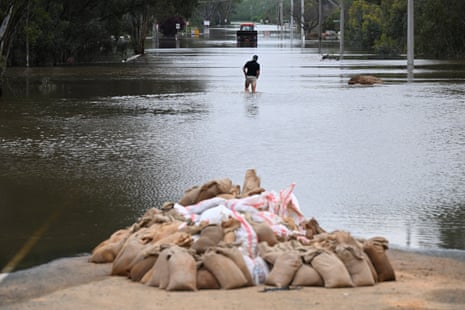
Treaties committee recommends ratification of the Australia-UK free trade deal
The Treaties Committee has recommended ratification of the Aus-UK Free Trade Agreement. The agreement represents the extension of our deep trade, regulatory and community ties with the UKhttps://t.co/ZYY3b0yu8t (1/2)
— Josh Wilson (@Josh4Freo) November 17, 2022
As Australia moves into negotiating further trade agreements, improving assessment, analysis, and stakeholder input in trade agreements and treaty-making process remain essential for public confidence in and engagement with the significance of trade agreements. (2/2)
— Josh Wilson (@Josh4Freo) November 17, 2022
Myanmar junta releases jailed Australian Sean Turnell
Myanmar’s junta has said it will release 700 prisoners, including a former British ambassador, a Japanese journalist and an Australian adviser to Aung San Suu Kyi’s ousted government.
Former British envoy Vicky Bowman, Australian economics adviser Sean Turnell and Japanese journalist Toru Kubota “will be released to mark National Day”, a senior officer told the AFP newswire.
Bowman, who served as ambassador from 2002 to 2006, was detained with her husband in August for failing to declare she was living at an address different from the one listed on her foreigner’s registration certificate.
They were later jailed for one year. Her husband, prominent artist Htein Lin, will also be released, the official said.
Sean Turnell was working as an adviser to Myanmar’s civilian leader Suu Kyi when he was detained shortly after the coup in February last year.
In September, he and Suu Kyi were convicted by a closed junta court of breaching the official secrets act and jailed for three years each.
Kubota, 26, was detained in July near an anti-government rally in Yangon along with two Myanmar citizens and jailed for 10 years.
Families gathered outside Insein prison in Yangon ahead of the expected announcement, an AFP reporter said.
– from AFP

Economic figures show urgency of IR bill and need for wages to rise: Burke
Hello! It’s Natasha May back with you again.
National Press Club has wrapped up and the employment minister Tony Burke has spoken in response to the latest unemployment figures.
The unemployment rate fell back to 3.4%, near a half-century low.
The ABS says around 32,000 jobs were added to the economy last month.
Burke says the favourable jobs market is encouraging for boosting wages.
Across the nation we find we now have what was meant to be the key in getting wages moving: sustained low unemployment. And still we’re in a position where Australian workers’ wages are going backwards and real wages today are lower than what they were a decade ago.
Anyone who questions whether or not the secure jobs better pay bill is urgent, just needs to look at these figures. All the macroeconomic conditions that you should have for real wages to be going forward in terms of what’s happening with unemployment, what has been happening with productivity, they are all there.
The drivers for real wage growth should be there, and certainly while real wages are not going to be in front of the extraordinary inflation figures we see at the moment, they should be at a figure higher than 3.1%.
The key way to get flexibility and productivity outcomes from business while at the same time getting better wage outcomes for workers is to get bargaining moving. That means simplifying the situation the single enterprise bargaining and opening pathways for multi-enterprise bargaining.
Back to the lovely Natasha May. Thanks for having me.
Russia ‘may well just let it happen’ if favourable: US expert on cyber crime and Medibank
At the press club, former US army major John Davis is asked about the recent Medibank hacks, revealed to be Russian in origin.
Q: There’s a lot of commentary about links to REvil (a Russian ransomware gang) … I want to ask how likely you think that it might be?
The groups name is said to be a combination of the words “ransom” and “evil”.
Davis says there’s a “strong possibility of a connection there”.
Any time a country like Russia, even if it may just have turned a blind eye towards what’s happening, if it sees what is happening from a criminal entity in the best interest of pursuing objectives that are favourable to that country, then they may well just let it happen. And you know, refuse to do anything about it because it’s a criminal entity and they … can deny it. There’s a whole bunch of anonymity and denial capabilities associated with it.
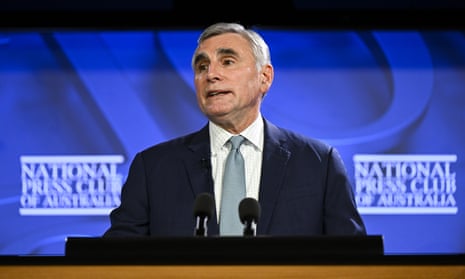
‘The lines have moved’: Davis says traditional between major powers now less likely
John Davis says traditional conflict is “still a concern” but less likely now in the modern world.
I’m not saying that traditional conflict is a thing of the past and is not going to happen any more. Obviously, it is still a concern. But traditional conflict between the major powers is probably a lot less likely if our adversaries can see effective use of these capabilities short of that old line and can undermine and weaken us and gain an advantage over us by using these capabilities without triggering what we view as traditional armed conflict. I think that we should recognise that.
We tend to, rightfully so … be very judicious in the use of this and calculating because we know the impacts of unintended consequences and we know that the risk of making mistakes is very high. And that’s why I believe these operational rules of the road that I mentioned are so important, and to get even countries like China to understand that it can be in their own best interest to put a little more care and oversight and restraint into these things in order to prevent something.
If we’re going to go to war with an adversary nation, this should be an intentional decision, not a mistake. And that’s what I worry about.
Cyber warfare hasn’t been as effective for Russia since day of Ukraine invasion, Davis says
John Davis turns to the war in Ukraine.
He says cyber operations haven’t been as “important or effective” an option for Russia since the day of the Ukraine invasion.
Most of my colleagues … expected to see a very robust Russian information warfare campaign, including cyber operations, waged against Ukrainian and NATO targets to set the stage for traditional combat operations.
I think many people assume that there would be more cyber activity than we have apparently witnessed once the armed aggression began … cyber hasn’t been as important or effective as an option for Russia after February 24. I believe that while cyber operations provide our adversaries with a broad range of operations in that grey zone short of war, short of traditional conflict, they provide a much narrower range once that threshold has been crossed.
There’s also quite likely a bit more going on in the cyber realm than we might realise. It simply hasn’t risen to levels at least publicly that many had expected.
He says Ukraine has also quickly become a “much tougher cyber target” by becoming less vulnerable and more resilient to cyber attacks.
Retired US army major says cyber adversaries will take advantage of a lack of regulation
Back at the National Press Club, retired US army major John Davis says “adversaries” of the US including China, Russia, North Korea and Iran studied what America was doing in the information warfare and cyber space in the late 1990s and took notes.
Our adversaries have invested significantly in the development of and implementation of information warfare. And cyber has emerged as one of the most prolific tools in the information warfare kit bag.
I believe that we’re going to continue to see each of other adversaries operate in what has become known as the grey zone. Below the traditional threshold for the use of force or armed aggression that would trigger a traditional physical response from the countries that they target.
The absence of effective, regulating global norms of responsible state behaviour in cyberspace, I believe, is going to continue to provide our adversaries with significant opportunities and even encouragement for offensive as part of the information warfare efforts. This is in part because of the absence of negative consequences from the countries they target, as has usually been the case thus far.
Victorian teals’ how-to-vote cards ‘good to go’ after tribunal decision

Adeshola Ore
Victoria’s civil and administrative tribunal has overturned a rejection of independent candidate’s how-to-vote cards by the state’s electoral commission.
A group of independent candidates launched legal action this week over the decision by the Victorian electoral commission. A number of independent “teal” candidates in Victoria’s state election submitted the how-to-vote cards which featured the number “1” beside their names and had blank preference boxes next to other candidates.
Independent candidate for the Liberal-held seat of Mornington Kate Lardner has told Guardian Australia it’s a “great outcome.”
Independents shouldn’t be pressured to put either party above the other… It’s about a community model of governing and we should be able to do that authentically.
It’s a step in the direction.
Our How to Vote card is good to go!
The Victorian Civil and and Administrative Tribunal has overturned the VEC’s decision to reject our How to Vote card.
Thanks to @Sophie4Kew for bringing this case to VCAT. pic.twitter.com/ckXGd5ucF4
— Dr Kate Lardner (@Kate4Mornington) November 17, 2022
Melissa Lowe, an independent candidate in the marginal electorate of Hawthorn and Sophie Torney in Kew had flagged the challenge to Guardian Australia on Tuesday. The duo, as well as independent candidates Felicity Frederico in Brighton, Nomi Kaltmann in Caulfield and Kate Lardner submitted the how-to-vote cards on Monday.
The VEC had said how-to-vote cards cannot include “any visuals of blank boxes, ticks or crosses next to candidate names”. The VEC told the candidates their how-to-vote cards were likely to “mislead or deceive” voters casting their ballot.

Amy Remeikis
Data breach proof and penalties on agenda at Senate hearing
One of the big issues that Liberal senator Paul Scarr and Greens senator David Shoebridge have been asking about during this hearing is the issue that a ‘benefit’ for a company needs to be proved, in order for penalties to apply. Because in a lot of cases, the ‘benefit’ is not to the company, but to the criminal who takes the data. And how do they quantify that what the ‘benefit’ is, in that case.
That is going to be another issue that the committee has to examine, as it works on its report to the government about the legislation.
The other big issue has been whether the penalties will lead to more non-reporting of hacks – some of the experts here thought not – and whether paying a ransom is something which should be illegal.
The committee hearing has now finished. The government wants this legislation passed by the end of the year, given *gestures* everything, so there is going to be a pretty tight turn around on this report.

Amy Remeikis
Greens senator’s question on worst kind of data breach met with silence
The legal affairs Senate committee examining the government’s data breach privacy legislation is starting to wrap up.
Greens senator David Shoebridge has asked representatives from the attorney general’s department what sort of breach would lead to the biggest penalties being applied and asks for an example.
There is silence and then the officials ask to take it on notice.
Greens back Labor’s ocean pledge but call for integrity in protections
The Greens have backed the federal government’s endorsement of the ocean conservation pledge to protect at least 30% of the ocean by 2030, with a caveat.
The party’s spokesperson for healthy oceans, Senator Peter Whish-Wilson, said the protections needed integrity, including improving Australia’s current marine protection network.
While 45% of Australia’s marine territory sits within marine protected areas (MPAs), just 17% of this territory is fully protected from oil, gas and fishing activities.
Whish-Wilson:
The Greens call on Labor to restore its original 2012 MPA program that would implement significant upgrades to ‘no-take’ or ‘green’ zones in ecologically significant areas of the marine environment. This is Labor’s legacy, and was a policy it took to the 2016 and 2019 elections. It is concerning that Labor took no policy to restore this network to the last election, and have again today been silent on their legacy.
Our marine wildlife will continue to decline and face risks without genuine levels of protection. That is because the current ‘green’ or ‘no-take’ zones are concentrated in the deeper waters near the edge of Australia’s marine jurisdiction, barely touching the continental shelf where threats to biodiversity are concentrated. Their placement has been deliberately adjusted by the previous government to not impact fishing or oil and gas interests.
Retired US army major general gives National Press Club address on cybersecurity
Over at the National Press Club, John Davis, a retired US army major general who is vice president for Palo Alto Networks, is speaking about cybersecurity, a topic he considers “very important in the modern era”.
I intend to discuss what our adversaries have been doing in the information realm over the past several years and the associated implications. I’m then going to talk about some of the work that I’ve been doing internationally to encourage responsible nations to follow several operational rules of the road for the employment of cyber deployments and why these rules are important. And then finally, I’d like to talk about what we’ve been seeing and perhaps not seeing from Russia when it comes to the use of cyber capabilities in Ukraine.
I’m handing you over to the very capable hands of Caitlin Cassidy but I’ll see you back here in an hour.








